Seller financing, also known as owner financing, is an alternative financing arrangement where the seller of a commercial property acts as the lender for the buyer. Instead of relying on traditional financing from a bank or financial institution, the seller finances a portion of the purchase price for the buyer, who then makes regular payments with interest over a set period.
This article by board-certified real estate attorneys at Texas Horizons Law Group explores the intricacies of seller financing in commercial real estate transactions.
What Is Seller Financing in Commercial Real Estate?

Commercial real estate deals often involve large sums of money. While traditional bank loans are usually the go-to option, seller financing can be a smart alternative.
For buyers who may struggle to qualify for conventional financing due to credit issues or the type of property, seller financing offers a way forward. Sellers may benefit from quicker sales, steady interest income, and the ability to spread out capital gains taxes over time.
Property Ownership in Seller-Financed Deals
In a seller financing arrangement, the buyer acquires title to the property subject to the seller's lien on the property as security for the amount of the purchase price financed by the seller. Once the full amount is paid off, the seller releases the lien.
Types of Seller Financing Agreements

There are several ways to structure a seller financing agreement, each with its own advantages and considerations. Let's delve into the most common types:
Promissory Note for Installment Payments
In this arrangement, the buyer signs a promissory note, outlining the repayment terms, including the principal amount, interest rate, and repayment schedule.
Lease Purchase Agreement
This structure combines elements of a lease and a purchase agreement. The buyer makes lease payments with a portion credited toward the eventual purchase of the property at a predetermined price.
Wrap-Around Mortgage
This is a more complex structure where the seller takes over an existing mortgage on the property and adds their own financing terms for the remaining purchase price. The buyer makes a single monthly payment to the seller, who then uses that amount to cover the existing mortgage and their own financing. However, in many instances, the seller may need to obtain the existing lender’s consent to avoid breaching the terms of the existing loan which prohibit the seller from conveying the property until after the existing lien is released.
Legal Documents in a Seller Financing Agreement

Several legal documents solidify a seller financing agreement, protecting both buyer and seller:
Promissory Note
This is the core document outlining the loan terms, including the interest rate, repayment schedule, and default consequences.
Deed of Trust
A deed of trust (i.e., "mortgage") is signed by the buyer to secure the loan. The property being sold is the collateral for the loan. If the buyer defaults on the loan, the seller can foreclose on the deed of trust lien.
Guaranty
If the buyer is an entity, such as a limited liability company or corporation, as is often the case in commercial real estate transactions, typically, the owners of the buyer execute a guaranty. As the guaranty makes the owners personally liable for the loan, it serves as additional assurance that the loan will be repaid.
Key Terms to Negotiate in Seller Financing Agreements

Beyond the basic structure of the financing arrangement, several specific terms require careful negotiation and clear documentation:
Interest Rates
In Texas, interest rates for owner financing typically hover around 8% of the purchase price, but they can range from 4% to 10%.
Prepayment Provisions
Sellers often include prepayment penalties to discourage early payoff, as they may be counting on the interest income. These penalties typically decline over time and might be structured as:
- Yield maintenance (ensuring the seller receives the same return regardless of prepayment)
- Declining percentage penalty (e.g., 5% in year one, decreasing by 1% annually)
- Fixed penalty (a set percentage of the remaining balance)
Loan Acceleration Clauses
These clauses allow the seller to demand immediate payment of the entire loan balance upon certain triggering events, such as:
- Late payments (typically after a specified grace period)
- Unauthorized property transfers or sales
- Failure to maintain insurance or pay property taxes
- Property abandonment or significant deterioration
Default Remedies
While foreclosure is the ultimate remedy, a well-structured agreement includes intermediate steps:
- Late payment penalties and fees
- Right to perform property inspections upon default
- Ability to cure deficiencies and add costs to the loan balance
- Assignment of rents in case of default
- Specific performance requirements
Due Diligence in Seller-Financed Transactions
Thorough due diligence is crucial in seller-financed commercial real estate transactions to protect both parties' interests.
For sellers:
- Buyer vetting: Verify financial stability through credit reports and references; assess business plans and income projections.
- Financial safeguards: Require a substantial down payment (20-30%) to ensure commitment and mitigate default risk.
- Background screening: Conduct thorough background checks on buyers and guarantors to identify potential red flags.
For buyers:
- Physical assessment: Complete professional property inspections and environmental assessments to identify potential liabilities.
- Legal review: Conduct comprehensive title searches for liens and encumbrances; verify all property leases and income sources.
- Valuation confirmation: Get independent appraisals to ensure the purchase price aligns with fair market value.
Examples of Commercial Seller Financing
Here are some examples showing how seller financing can work for different commercial properties:
These examples illustrate how flexible financing arrangements can solve problems that traditional lending simply can't address.
Advantages of Seller Financing
Seller financing offers several advantages for both parties. The seller can enjoy:
- Quicker sales: Eliminating the need for lender approval can expedite the sale process.
- Potentially higher selling prices: Sellers may be able to command a higher price for the property, as the buyer's options may be limited.
- Stable returns: The seller can earn a consistent income through installment payments, often at an interest rate higher than traditional investment options.
For the buyer, seller financing offers:
- Easier qualification: Seller financing may be available even if the buyer has a less-than-ideal credit history.
- Flexibility: The terms can be negotiated between the buyer and seller, offering room for creative structuring.
- Lower closing costs: Without a traditional lender involved, some of the typical fees associated with conventional loans may be avoided
If traditional financing is not an option or is not advantageous in a particular situation, seller financing may be a better method. Consulting a real estate attorney can help you determine which form of financing is right for you.
Disadvantages of Seller Financing

While seller financing offers advantages, it also comes with potential drawbacks.
For the seller, a lack of liquidity could be an issue. The seller won't receive the full sale price upfront, which can be a drawback if immediate cash is needed.
Additionally, there is the risk of default to consider. If the buyer defaults, the seller must go through the legal process to foreclose on the seller's deed of trust lien, incurring additional costs and time delays. The condition of the property could deteriorate during the life of the loan.
For the buyer, interest rates are a potential drawback, as the interest rates in a seller-financed deal are often higher than those offered by third-party lenders. Some seller financing arrangements may also require large balloon payments, making it crucial for the buyer to refinance or sell before the loan comes due.
Risk Mitigation Strategies in Seller Financing

Both buyers and sellers can take practical steps to reduce risks in owner-financed deals:
For sellers:
- Ask for a bigger down payment (25-35%) to create a safety cushion
- Get personal guarantees from business owners, not just their company
- Make sure you're named on the property insurance policy
- Set up tax and insurance escrows so these bills don't go unpaid
- Check on the property occasionally to make sure it's being maintained
- Request regular financial updates to spot problems early
For buyers:
- Get title insurance to protect against ownership surprises
- Document the property's condition at purchase with photos and reports
- Make sure you have a reasonable time to fix problems before facing penalties
- Cap interest rate increases if your loan has an adjustable rate
- Secure the right to pay off the loan early without harsh penalties
Smart moves for everyone:
- Create a reserve fund for major repairs and maintenance
- Consider hiring a neutral third party to handle payments and paperwork
- Include mediation clauses to avoid expensive lawsuits
- Add first right of refusal if the buyer wants to sell before paying off the loan
These common-sense protections help both sides get what they want from the deal.
Alternative and Hybrid Financing Structures

Beyond traditional seller financing arrangements, several hybrid approaches can offer advantages in commercial transactions:
Partial Seller Financing
In this arrangement, the buyer obtains conventional financing for a portion of the purchase price, and the seller finances the remainder. Benefits include:
- Better terms for the buyer from the primary lender due to a lower loan-to-value ratio
- Potentially faster closing than with 100% traditional financing
- Risks to the seller who holds a second-position lien. If the buyer defaults on the loan to the seller, the latter may be forced to purchase the property after a foreclosure sale, subject to the first lien. If the buyer defaults on the first loan, the seller will need to remedy the default to protect the seller’s second-position lien on the property.
Seller Financing with SBA Involvement
For qualified small business buyers, combining seller financing with SBA loans can be advantageous:
- The SBA 504 program may allow seller financing as part of the required equity contribution
- Seller financing can supplement SBA 7(a) loans, particularly for goodwill or business value components
- Sellers must typically subordinate to the SBA lender's position
Private Equity Partnerships
Some transactions combine seller financing with private equity investment:
- The seller finances a portion of the purchase price
- Private equity investors provide additional capital
- The buyer contributes a smaller equity stake
- All parties share in the property's future appreciation
Why You Need a Real Estate Attorney for a Seller Financing Agreement

Regardless of the chosen structure, a well-drafted seller financing agreement is crucial. Its intricacies can vary depending on the structure, property type, and the presence of a balloon payment. Here's why a real estate attorney is crucial for both buyers and sellers:
Benefits for Sellers
A real estate attorney will draft the financing documents to protect your interests. This includes ensuring the documents are recorded correctly by securing the loan with a deed of trust against the real property.
Benefits for Buyers
An attorney will review the agreement to ensure the financing terms don't unreasonably restrict your intended use of the property and that the documents are drafted to reflect your understanding of the payment structure, including the amount and frequency of payments, interest rate, and length of loan. This safeguards your ability to use the property as planned after the purchase and your rights in ownership and usage of the property that is subject to the Seller's lien.



